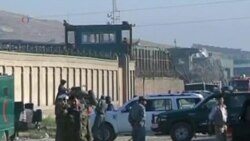The Pentagon says Afghanistan will need U.S. support after the combat mission there is over in 2014. But for the U.S. troops to stay, there needs to be a bilateral security agreement. Talks were suspended in June by Afghan President Hamid Karzai in protest against U.S. overtures to the Taliban.
The United Nations says civilian deaths in Afghanistan are up 23 percent this year, with most coming at the hands of anti-government forces. The rising toll reflects the challenge Afghan security forces will face when U.S. troops draw down next year.
Some U.S. troops need to stay to help, analysts say.
"The Afghan forces that have been put together by the United States and its coalition partners do, in fact, have significant limits in terms of their logistical support, in terms of their intelligence operations, in terms of a number of other things," said Thomas Lynch, a research fellow at the National Defense University in Washington. "So, it will be very useful to have a continuing relationship to train, advise and mentor."
Analysts say Washington and Kabul need to get back to talks that were halted by the Afghan president over U.S. overtures to the Taliban.
Michael O’Hanlon of the Brookings Institution says if that doesn't happen, the Taliban will benefit.
"We have to concentrate our anger against the enemy, not at each other. So, I frankly wish that President Karzai, even though I understand his frustration, would not have done this," he said.
What would an Afghan-U.S. agreement look like? Thomas Lynch says the U.S. wants to legally protect its troops.
"This agreement will have to meet certain requirements, minimum threshold requirements for U.S. military personnel to stay, and chief among these will be that the U.S. forces that remain behind have first requirements...for legal trials in the U.S military courts system," he said.
And the Afghans need to be comfortable with the U.S. troop presence.
"We should try to let the Afghan people know that we are firmly committed to their long term security, and, if they continue to do their part, we will stay after 2014 and be very clear and direct about the fact that we would never negotiate any secret deal with the Taliban," said Michael O'Hanlon.
In neighboring Pakistan Thursday, U.S. Secretary of State John Kerry vowed that the U.S. will not abandon Afghanistan and expressed confidence a deal with Afghans will be reached soon.
The United Nations says civilian deaths in Afghanistan are up 23 percent this year, with most coming at the hands of anti-government forces. The rising toll reflects the challenge Afghan security forces will face when U.S. troops draw down next year.
Some U.S. troops need to stay to help, analysts say.
"The Afghan forces that have been put together by the United States and its coalition partners do, in fact, have significant limits in terms of their logistical support, in terms of their intelligence operations, in terms of a number of other things," said Thomas Lynch, a research fellow at the National Defense University in Washington. "So, it will be very useful to have a continuing relationship to train, advise and mentor."
Analysts say Washington and Kabul need to get back to talks that were halted by the Afghan president over U.S. overtures to the Taliban.
Michael O’Hanlon of the Brookings Institution says if that doesn't happen, the Taliban will benefit.
"We have to concentrate our anger against the enemy, not at each other. So, I frankly wish that President Karzai, even though I understand his frustration, would not have done this," he said.
What would an Afghan-U.S. agreement look like? Thomas Lynch says the U.S. wants to legally protect its troops.
"This agreement will have to meet certain requirements, minimum threshold requirements for U.S. military personnel to stay, and chief among these will be that the U.S. forces that remain behind have first requirements...for legal trials in the U.S military courts system," he said.
And the Afghans need to be comfortable with the U.S. troop presence.
"We should try to let the Afghan people know that we are firmly committed to their long term security, and, if they continue to do their part, we will stay after 2014 and be very clear and direct about the fact that we would never negotiate any secret deal with the Taliban," said Michael O'Hanlon.
In neighboring Pakistan Thursday, U.S. Secretary of State John Kerry vowed that the U.S. will not abandon Afghanistan and expressed confidence a deal with Afghans will be reached soon.





